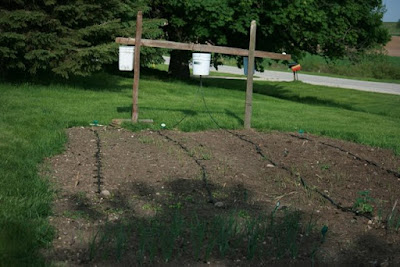
DEVELOPMENT-SENEGAL: Water Still A Problem In Dakar
By Koffigan E. Adigbli
DAKAR, Aug 4 (IPS) - Dakar's suburban communities still deal with irregular access to water. The problem is especially pressing for neighborhoods such as Yeumbeul, Diamaguene et Cambérène.
Many households in those neighborhoods lack access to potable water. However, the Sénégalaise des eaux (SDE), a water-distribution corporation, guarantees that water problems will become a distant memory once technical issues have been resolved.
In Diamaguene, a suburb not far from National Highway 1, few homes are connected to the SDE. Residents have to travel with jugs to other neighbourhoods for drinking water.
Astou Diagne brims with rage. "Politians came around with well-oiled speeches on local issues, especially concerning water. But despite requests put in to the SDE we still don't have any water lines," she complains.
There's only one water fountain in the neighborhood, managed by Malick Ndiaye. Women start lining up first thing in the morning to increase their chances of getting water. Fatou Diop Gueye, a mother from the neighborhood told IPS: "The early birds are luckiest, they can get water for the whole day."
Ndiaye doesn't it find it much easier, since he rarely gets a full night's sleep. "I get disturbed all hours of the night by women who want me to check the water faucet, and since at midday the water gets cut off they have to turn to the wells for water for cooking."
Adama Niang, a law student at Dakar's Université Cheikh Anta Diop, knows all too well how dangerous is could be to drink well water. "Well water should be treated, but there's no alternative -– we don't even have faucets and plumbing in the house."
Residents are in such a bind they can't even complain about the price of water. Malick sells 5 litres of water for 25 CFA francs (approximately 6 cents), 50 litres for 150 CFA (36 cents). It is slightly more expensive than in other neighborhoods.
In Cambérène, a neighborhood 10 kilometres from the city centre, families have to deal with drainage and pipes laid about randomly -– often dangerously close to toilets and ablution facilities. Adama Dièye, an SDE technician, told IPS this not only violates standards, it poses a great risk of contamination if ever any pipes burst.
This is a suburb with very narrow streets, because it was not mapped out by the municipal topographical office. Tap water sometimes has a reddish color. According to Marthe Ndong, a local teacher, service is irregular and the water has an aftertaste. "The water here is something special. Sometimes you turn on the faucet and nothing comes, or its red and tastes really bad. But we deal with it," she told IPS jokingly.
However, the administration at the Sénégalaise des eaux insists that water access problems will soon be resolved. SDE's director, Mamadou Dia, notes that the increased unreliability was due in large part to the Société nationale des eaux du Sénégal (SONES) having replaced a large water conduit originally built in 1958. The initiative had two goals: improve both the quality and quanity of water available, especially in the suburbs.
Dia also added that Dakar needs 295,000 cubic meters and utilities provide 300,000. Hence, the slightest technical difficulty –- such as a power outage -– can cause disruptions in service.
Cheik Fall, director of SONES, announced that new water treament stations are being built and should be operational by December. The SONES is a public utility charged with planning and investing in water infrastructure.
Fall laid to rest any fears of price hikes. "There have been increases in production costs since 2003, yet the price of water has stayed the same," he pointed out. The reddish colour of suburban water by no means suggests unsanitary conditions. The water is verified by laboratories such as the Institut Pasteur and more than 90 percent of the water tested meets the standard."
According to SDE archives, the average Senegalese citizen receives 35 litres of water daily, and not all users pay the same price. If the average cost of water is 419 FCFA (1 dollar) a cubic metre, it costs gardeners 268 FCFA (64 cents) for farmers, households 372 FCFA (89 cents) and commercial users 639 FCFA ($1.5 dollars).
Water distribution also relies on electricity to run the pumps; but with increasing blackouts, lineups at neighborhood wells will probably grow longer, as all seek this precious commodity.











